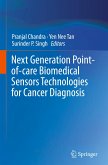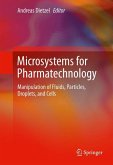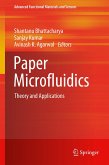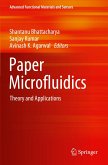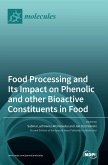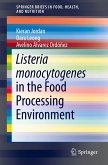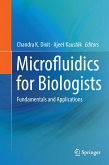Microfluidics in Food Processing
Technologies and Applications
Herausgeber: Pandey, Ashok; Sirohi, Ranjna; Dussap, Claude-Gilles; Kaur, Barjinder Pal; Tarafdar, Ayon
Microfluidics in Food Processing
Technologies and Applications
Herausgeber: Pandey, Ashok; Sirohi, Ranjna; Dussap, Claude-Gilles; Kaur, Barjinder Pal; Tarafdar, Ayon
- Gebundenes Buch
- Merkliste
- Auf die Merkliste
- Bewerten Bewerten
- Teilen
- Produkt teilen
- Produkterinnerung
- Produkterinnerung
This reference book introduces principles of microfluidization and their applications in the food industry. It covers the use of microfluidics in enhancing food safety, synthesizing nanomaterials, and optimizing various food products. This book is a valuable resource for researchers, scientists, and professionals in the food industry.
Andere Kunden interessierten sich auch für
![Next Generation Point-of-care Biomedical Sensors Technologies for Cancer Diagnosis Next Generation Point-of-care Biomedical Sensors Technologies for Cancer Diagnosis]() Next Generation Point-of-care Biomedical Sensors Technologies for Cancer Diagnosis110,99 €
Next Generation Point-of-care Biomedical Sensors Technologies for Cancer Diagnosis110,99 €![Microsystems for Pharmatechnology Microsystems for Pharmatechnology]() Microsystems for Pharmatechnology74,99 €
Microsystems for Pharmatechnology74,99 €![Paper Microfluidics Paper Microfluidics]() Paper Microfluidics74,99 €
Paper Microfluidics74,99 €![Paper Microfluidics Paper Microfluidics]() Paper Microfluidics74,99 €
Paper Microfluidics74,99 €![Food Processing and Its Impact on Phenolic and other Bioactive Constituents in Food Food Processing and Its Impact on Phenolic and other Bioactive Constituents in Food]() Food Processing and Its Impact on Phenolic and other Bioactive Constituents in Food83,99 €
Food Processing and Its Impact on Phenolic and other Bioactive Constituents in Food83,99 €![Listeria monocytogenes in the Food Processing Environment Listeria monocytogenes in the Food Processing Environment]() Kieran JordanListeria monocytogenes in the Food Processing Environment37,99 €
Kieran JordanListeria monocytogenes in the Food Processing Environment37,99 €![Microfluidics for Biologists Microfluidics for Biologists]() Microfluidics for Biologists110,99 €
Microfluidics for Biologists110,99 €-
-
-
This reference book introduces principles of microfluidization and their applications in the food industry. It covers the use of microfluidics in enhancing food safety, synthesizing nanomaterials, and optimizing various food products. This book is a valuable resource for researchers, scientists, and professionals in the food industry.
Hinweis: Dieser Artikel kann nur an eine deutsche Lieferadresse ausgeliefert werden.
Hinweis: Dieser Artikel kann nur an eine deutsche Lieferadresse ausgeliefert werden.
Produktdetails
- Produktdetails
- Verlag: Taylor & Francis Ltd
- Seitenzahl: 260
- Erscheinungstermin: 14. März 2025
- Englisch
- Abmessung: 254mm x 178mm
- ISBN-13: 9781032609812
- ISBN-10: 1032609818
- Artikelnr.: 70676618
- Herstellerkennzeichnung
- Libri GmbH
- Europaallee 1
- 36244 Bad Hersfeld
- 06621 890
- Verlag: Taylor & Francis Ltd
- Seitenzahl: 260
- Erscheinungstermin: 14. März 2025
- Englisch
- Abmessung: 254mm x 178mm
- ISBN-13: 9781032609812
- ISBN-10: 1032609818
- Artikelnr.: 70676618
- Herstellerkennzeichnung
- Libri GmbH
- Europaallee 1
- 36244 Bad Hersfeld
- 06621 890
Dr. Ayon Tarafdar is currently an ARS scientist at ICAR-Indian Veterinary Research Institute under the Ministry of Agriculture and Farmers Welfare. He earned his B Tech degree from IIT Kharagpur (India), M Tech from GBPUA&T, Pantnagar (India) and PhD from NIFTEM (Kundli, India) in Food Engineering and has worked as a fully funded researcher in Washington University in St. Louis, USA. His main research focus has been on non-thermal food processing operations, bioprocess modelling and optimization, machine learning, food waste valorization, advanced food characterization tools and precision agriculture. He has published more than 90 scientific research and reviews in addition to thirteen book chapters, two books and one filed patent. Dr. Tarafdar has been awarded with several meritorious fellowships during his academic journey including the TEQIP-II fellowship, and NIFTEM research fellowship. He serves on the editorial board of the Journal of Food Quality and the International Journal of Chemical Engineering and has also served as the Guest Editor of Bioresource Technology and Journal of Food Science and Technology. Dr. Ranjna Sirohi is currently an assistant professor at the University of Petroleum and Energy Studies, Dehradun, Uttarakhand, India. She earned B Tech degree in Biochemical Engineering and M Tech degree in Agricultural Engineering, and PhD in Process and Food Engineering from G.B. Pant University of Agriculture and Technology, Pantnagar, India. She was a research professor at Korea University, Seoul, Republic of Korea before joining the UPES. She has worked as researcher at École Polytechnique Fédérale de Lausanne, Switzerland. Her major research interests are in bioprocess technology: food & food waste valorisation, waste to wealth - biofuels. She has 150 publications/communications to her credit that include 101 research and review papers, seven books, 21 book chapters and popular articles and 21 conference proceedings and two filed patents. Dr. Sirohi has won several awards and honors that include Best Poster Award in BSHAFEE-2021, IIT, Jodhpur; Best PhD Thesis Award from the International Society for Energy, Environment and Sustainability (2020); AU-CBT Excellence Award, the Biotech Research Society, India (2020); Research Excellence Award at the international conference on New Horizons in Biotechnology, Trivandrum, India (2019); Best Poster Award in 8th International Forum on Industrial Bioprocessing-2019 (IBA-IFIBiop 2019), Miri, Sarawak, Malaysia (2019), and Research Excellence Award at International Conference on Bio-Innovation for Environmental and Health Sustainable Developments (BEHSD-2018), Lucknow, India (2018), Best PhD Student Award (2020) and Pandey Research Excellence Award at the 10th International Forum on Industrial Bioprocessing (2022). She is a life member of several professional societies. Dr. Barjinder Pal Kaur is an assistant professor in the Department of Food Engineering NIFTEM since 2013. She earned her B Tech (2006) in agricultural engineering and M Tech (2009) in processing and food engineering from Punjab Agricultural University, Ludhiana. She earned her doctoral degree from Indian Institute of Technology Kharagpur (2016). She is the author of several scientific articles published in prestigious international journals (50), published four books related to drying technology, and four book chapters. Dr. Kaur has guided 3 PhD, 19 M Tech and several B Tech students as a research supervisor. She is also associated with various journals of international repute as an editorial board member and reviewer. Her area of expertise is novel food processing technologies such as high-pressure processing, microfluidization; drying technology; application of hydrogels and liposomes in food. Professor Ashok Pandey is currently a Distinguished Scientist at the Centre for Innovation and Translational Research, CSIR-Indian Institute of Toxicology Research, Lucknow, India and executive director (honorary) at the Centre for Energy and Environmental Sustainability - India. Formerly, he was eminent scientist at the Center of Innovative and Applied Bioprocessing, Mohali and chief scientist & head of Biotechnology Division and Centre for Biofuels at CSIR's National Institute for Interdisciplinary Science and Technology, Trivandrum. His major research and technological development interests are industrial and environmental biotechnology and energy biosciences, focusing on biomass to biofuels and chemicals, waste to wealth and energy, industrial enzymes, etc. Professor Pandey is adjunct/visiting professor/scientist in universities in France, Brazil, Canada, China, Korea, South Africa, and Switzerland and also in several universities in India. He has 16 patents, 120 books, >950 papers and book chapters. Professor Pandey is the recipient of many national and international awards and honours, which include Highest Cited Researcher (Top 1% in the world), Clarivate Analytics, Web of Science (2018-till date); Life-Time Achievement Award from the Biotech Research Society, India (2018); Life-Time Achievement Award from Venus International Research Awards (2018), Most Outstanding Researcher Award from Career360 (2018), Life-Time Achievement Award from the International Society for Energy, Environment and Sustainability (2017); Academician of European Academy of Sciences and Arts, Austria (2015); Honorary Doctorate degree from Univesite Blaise Pascal, France (2007); Thomson Scientific India Citation Laureate Award, USA (2006); UNESCO Professor (2000), etc. He is a fellow of various academies, which include The World Academy of Sciences (2023), World Society for Sustainable Energy Technologies (2022); Indian Chemical Society (2022); Royal Society of Biology, UK (2016); International Society for Energy, Environment and Sustainability (2016); National Academy of Sciences, India (2012); Association of Microbiologists of India (2008), International Organization of Biotechnology and Bioengineering (2007) and the Biotech Research Society, India (2005). Professor Claude-Gilles Dussap graduated in Chemical Engineering from Institut du Génie Chimique (ENSIACET - Toulouse) in 1978. He earned his PhD degree in chemical and biochemical engineering at Blaise Pascal University (Clermont-Ferrand). He is presently head of the team Chemical Engineering, Applied Thermodynamics and Biosystems at Institut Pascal (engineering sciences lab of University Clermont Auvergne - CNRS). He has been very involved in the analysis of the relationships which exist between the physiological responses of microorganisms and bioreactors environment including a thorough analysis of bioreactor performances regarding the mass, heat, light-energy transfer and mixing properties of bioreactors. Professor Dussap has extensive experience in mathematical modeling of biological kinetics, thermodynamic equilibrium properties of aqueous biological solutions and of reactor characteristics. He has a track record of experience in the design and the mathematical modeling of MELiSSA (MicroEcological Life Support System Alternative) ecosystem, which is the biological life support system developed by European Spatial Agency (ESA) for long duration space missions. His main domain of expertise covers all the chemical engineering aspects of the bioreactors' design, modeling, scale-up and control in relation with the food quality and nutritional properties of food recipes for astronauts. His main research activities concern chemical engineering and metabolic engineering. His interests have been extended to bioenergy production processes and assessment of environmental impact of biotechnology processes regarding 2G and 3G biofuels. The results of these research works have been published in more than 150 papers. He has supervised more than 30 PhD students and 70 MSc lab works. In terms of education, Professor Dussap has been head of Polytech Clermont-Ferrand for 10 years (2001 - 2011). Besides the development of his own structure, he has brought a pioneering contribution to the construction of the actual Polytech group in France. Since 2012, he is general delegate (executive director) of Polytech Group, which comprises the 15 national engineering faculties. He acts at the national level as a supervisor of the activities of the different working groups of the Polytech network (education, admission, international affairs, etc.). By example, he has been much involved in the elaboration of development plan of international part of AVOSTTI that is the operational framework for establishing international memorandum of understandings.
1.Introduction to microfluidization. 2. Microfluidic chip technology in
food safety. 3. Paper based Microfluidic devices. 4. Microfluidic nano
detection system for molecular interactions. 5. Microfluidic devices for
synthesizing nanomaterials. 6. Microfluidization of juice derived from
plant products. 7. Microfluidization of milk and milk products. 8.
Microfluidics based food micro- and nanodelivery systems. 9.
Microfluidization of cereal-based products. 10. Microfluidization of meat
and egg-based products. 11. Microfluidics for extraction of bioactive
ingredients. 12. Microfluidization of nut-based products. 13.
Microfluidization of seed protein isolates.
food safety. 3. Paper based Microfluidic devices. 4. Microfluidic nano
detection system for molecular interactions. 5. Microfluidic devices for
synthesizing nanomaterials. 6. Microfluidization of juice derived from
plant products. 7. Microfluidization of milk and milk products. 8.
Microfluidics based food micro- and nanodelivery systems. 9.
Microfluidization of cereal-based products. 10. Microfluidization of meat
and egg-based products. 11. Microfluidics for extraction of bioactive
ingredients. 12. Microfluidization of nut-based products. 13.
Microfluidization of seed protein isolates.
1.Introduction to microfluidization. 2. Microfluidic chip technology in
food safety. 3. Paper based Microfluidic devices. 4. Microfluidic nano
detection system for molecular interactions. 5. Microfluidic devices for
synthesizing nanomaterials. 6. Microfluidization of juice derived from
plant products. 7. Microfluidization of milk and milk products. 8.
Microfluidics based food micro- and nanodelivery systems. 9.
Microfluidization of cereal-based products. 10. Microfluidization of meat
and egg-based products. 11. Microfluidics for extraction of bioactive
ingredients. 12. Microfluidization of nut-based products. 13.
Microfluidization of seed protein isolates.
food safety. 3. Paper based Microfluidic devices. 4. Microfluidic nano
detection system for molecular interactions. 5. Microfluidic devices for
synthesizing nanomaterials. 6. Microfluidization of juice derived from
plant products. 7. Microfluidization of milk and milk products. 8.
Microfluidics based food micro- and nanodelivery systems. 9.
Microfluidization of cereal-based products. 10. Microfluidization of meat
and egg-based products. 11. Microfluidics for extraction of bioactive
ingredients. 12. Microfluidization of nut-based products. 13.
Microfluidization of seed protein isolates.


